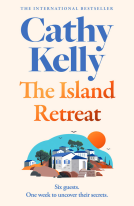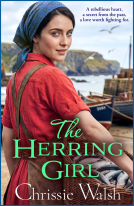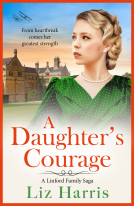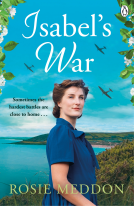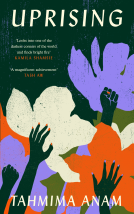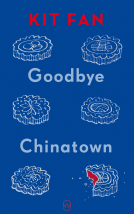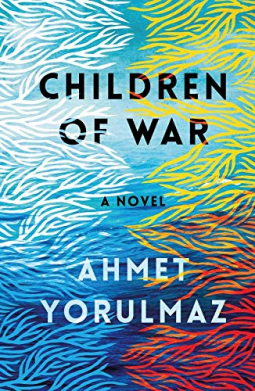
Children of War
by Ahmet Yorulmaz
This title was previously available on NetGalley and is now archived.
Send NetGalley books directly to your Kindle or Kindle app
1
To read on a Kindle or Kindle app, please add kindle@netgalley.com as an approved email address to receive files in your Amazon account. Click here for step-by-step instructions.
2
Also find your Kindle email address within your Amazon account, and enter it here.
Pub Date 10 Jan 2020 | Archive Date 29 Jun 2020
BooksGoSocial | Neem Tree Press
Talking about this book? Use #ChildrenofWar #NetGalley. More hashtag tips!
Description
Inspired by the intimate diaries of a refugee family, Children of War is an evocative novel that seamlessly intertwines the allure, complexity, and scars of Crete's storied past to tell the intimate tale of an ordinary man caught in the vortex of extraordinary times.
For fifteen generations, Hassanakis's family has called Crete home, and he's always seen himself as a true Cretan. Yet, as the world around him is engulfed in the chaos of collapsing empires and simmering conflicts, Hassanakis finds himself at the crossroads of identity. In the face of escalating ethnic violence, his family's flight to Chania becomes a poignant journey of survival.
Amid the turmoil, Hassanakis weaves new roots, donning distinctive attire that earns him the nickname 'Hassan the mirror'. As World War I reaches its crescendo and the Turkish War of Independence rages on, a profound romance ignites between him and the graceful Hüsniye. But soon the prospect of being uprooted to a foreign Turkey becomes a chilling reality. Can he fathom leaving behind the life he's built for a land where he's a stranger?
Advance Praise
"This book dazzled and fascinated me. I felt as if Yorulmaz and I were sitting in a cafe, chatting over strong Turkish coffee. And then I fell silent, mesmerized as the old man recounted stories from his life, leisurely...I highly recommend this book to those who like historical or literary fiction, or those who like to read about immigration/immigrants." --@MeredithRankin2 Netgalley Top Reviewer
Available Editions
| EDITION | Other Format |
| ISBN | 9781911107293 |
| PRICE | $12.95 (USD) |
Links
Average rating from 24 members
Featured Reviews
This was a heart warming book during the war regarding Turkey and Crete. Love both of these countries and also love historical books on war. Brilliant book
“If you decide to cause trouble instead of getting along with people and living in peace, then you end up getting a beating. It’s the poor wretched people who end up bearing the brunt of the mistakes made by their ancestors and those in power!” _Kiri Vladimiros_
This book was really shocking, tragic and so real in an irritating way. It is about the story of Kiri Hassan a Muslim Turk from the island of Crete ( now part of Greece) and the tragic departure of about 1.8 million people from their homeland and to what so-called "motherland" due to the treaty of lausanne 1923.
In my opinion, this book is great. For the first time instead of seeing Muslims as terrorists, you will see them as victims. What I liked most was the writer's great descriptive way as you will feel that his words and phrases are graphic, the scenes are really vivid. My favourite character was the wise, big-hearted, great Kiri Vladimiros.
Without doubt, the Greco-Turkish War of 1919 is an important part of Turkish and Greek histories.
In Turkey, I, like my peers, began to study the history of the Ottoman Empire/the Republic of Turkey at an early age. Whenever we covered WWI and the decline of the Ottoman Empire in high school (many, many years ago), we took great pride in the victory of the Turkish Great Offensive that ended the Greco-Turkish War and gave birth to the Turkish Republic.
A remarkable moment in history, for sure–one that needed to be studied and remembered. As we delved into the facts, the dates, the ramifications, and so on in high school, I realized later in college that we had not gone beyond the history textbooks.
There’s so much that is left out when we study the history of the age-old rivalry between two neighbors, Greece and Turkey in general and the Greco-Turkish War in particular. For example, I don’t remember us covering the emotional, mental and physical challenges that Greek and Turkish refugees faced during the Great Population Exchange. I don’t remember us humanizing the process nor do I remember us delving deep into the injustices the two governments had inflicted on the refugees as they were compelled to leave their home, properties, friends, lovers, and memories behind.
Children of War fills this gap in the historical record by presenting an honest narrative about war, identity and collective trauma. Penned by Turkish journalist and author Ahmet Yorulmaz (1932-2014) in 1997 and translated from the Turkish by Paula Darwish in 2019, this brief work of historical fiction sheds a light on a forgotten part of Ottoman/Turkish/Greek history: the forced migration of Cretan Muslims from Greece to Anatolia. By signing the Lausanne Peace Treaty in 1923, Turkey and Greece agreed to displace two million people (app. 23.000 of whom were Muslim Cretans) on the basis of their religion. Yorulmaz’s beautifully written story explores the ramifications of the population exchange through the perspective of a young Muslim Cretan, Hassanaki.
Hassanaki narrates his experiences, as he explores what it means to straddle two identities at a historical conjuncture characterized by the rise of nationalist trends. As the number of anti-Muslim/Turkish hate crimes increases on the Island of Crete, Hassanaki struggles to comprehend the polarizing rhetoric that divides the Cretans into “us” and “them.”
As Muslim Cretans are increasingly viewed as a threat to Greek unity, it becomes more and more challenging to maintain peace on the island. Thus, Hassanaki is forced to flee Crete, and he emigrates to Ayvalik, Turkey, a coastal city located right across the Island of Lesvos, in 1923. In Greece, Hassanaki, like other Muslims, is seen as “the Other” in his homeland. Once he is compelled to “swallow the poison of leaving our homeland behind us” and relocates to Turkey, his struggle to belong continues.
Although he never tells the reader straightforwardly, it is evident that Hassanaki writes to remember–and to reclaim his Greekness and Turkishness. We can then say that the book that we are reading, which is based on the diaries of a Cretan refugee found in Ayvalik, serves as a tool through which Hassanaki preserves his hyphenated identity.
Children of War is one of the most important translated works released in 2020. Hassanaki’s story encourages us to resist the politics of demonization that breeds polarization and fear—fear of difference and of change.
Through all the marginalized characters whose voices it recovers, from the Black Cretan couple Mullah Mavruk and his wife Cemile to Hassanaki’s lover Husniye who is of North African descent, Children of War reminds us to challenge normative assumptions about ethnicity, race and identity.
Read my full review on http://readingundertheolivetree.com/2020/06/16/from-greece-to-turkey-children-of-war-by-ahmet-yorulmaz/
This is a beautiful, haunting story, based on notebooks left by a Cretan refugee after the population exchange with Turkey. It is told in a slow and deliberate manner, building a picture of the cultures and politics that shaped one man's life.
Hassanakis is a Muslim boy who is forced to first leave his village and then later his island, after his family has been there for generations. "So what if about fifteen generations of my family lived there? In the end, the Greeks cried 'Turks out!'"
Children of War offers great insight to a time and place that is not that well known in the West. I felt the very weight of history, the sense of confusion and loss throughout this novel that I felt when visiting Kayaköy, a Turkish city abandoned as a result of that population exchange.
Paula Darwish brings this important voice to life, and I am grateful to the publisher for this advance review copy.
A war fought for either selfish or any altruistic reason, is detrimental to mankind. The perils of any war is not only horrendous but changes the course of life and history, lacerating them in numerous ways for generations. When you are taking in the enormity of a major moment in history, it is easy to forget that behind the epic events lie a multiplicity of individual stories. This book portrays the exact sentiments on how war-laden displacement can influence the working of human life. Ahmet Yorulmaz’s “Children of War” in English with a translation by Paula Darwish, is the story of Hassanakis, a young Muslim boy of Turkish descent growing up on Crete during WWI.
1919. The invasion of the Greek tropes. As Muslim Cretans were increasingly viewed as a threat to Greek unity, it resulted in the forced migration of Cretan Muslims from Greece to Turkey. Thus, Hassanaki is forced to flee Crete, and he emigrates to Ayvalik, Turkey, a coastal city located right across the Island of Lesvos, in 1923. Against the backdrop of such a terrible wholesale movement of people, which upended countless centuries of ownership and connection to the land, it is all too easy to find yourself swamped by the sheer enormity and horror of the events at hand. The story contained within this book captured one of the most overlooked aspects of the cruel war – the deliquescing of identity & nationhood, and the repercussions of the population exchange that occurred. Brutal and captivating, Yorulmaz is a talented writer, skilled in conveying a complex, long conflict succinctly while remaining even-handed in tallying the atrocities inflicted on the lives of people brandished by the war. It is through this propensity that the writer can humanise the statistics of forced migration, 1.6 million displaced. The virtue of great political fiction is that even if people feel far removed from certain events, a great writer will bring to life the human stories that will gage the interest of the reader and encourage awareness. I, for one, found myself researching Greco-Turkish war after reading this novel to increase my understanding.
 Account D, Reviewer
Account D, Reviewer
i really enjoyed reading this book, I liked that it wasn't a typical memoir. The story was enjoyable and I was glad to go on this journey with them.
 Diane D, Reviewer
Diane D, Reviewer
A well written account of an unfamiliar time in history. Crete, an large Greek island close to the Turkish mainland has been a place of refuge for Turkish migrants for many centuries, and for some, their homeland as they have never lived anywhere else. Cretans and Turks had lived alongside each other respecting each others customs and religious beliefs. We relive the ethnic cleansing of these migrants through a young Muslim boy Hassanakis, whose Turkish family have lived on Crete for fifteen generations. We join them in the aftermath of WW1 when powerful countries are deciding the future of Greece and the fading Ottoman empire, the Treaty of Lausanne in 1923 renegotiated the borders of the Turkish Republic. They are continually on the move to escape harm yet meet friendly Greeks and Turks who support them along their journey. Hassanakis forms a bond with a Greek employer, falls in love and creates a life for himself despite the circumstances. A interesting read.
Thanks to Netgalley, the author and Neem Tree Press publishers for an ARC in return for an honest review
Readers who liked this book also liked:
Glenda Young
General Fiction (Adult), Historical Fiction, Women's Fiction

